12 Best Keyword research tools for 2025 (Rank Faster)
12 Best Keyword research tools for 2025 (Rank Faster)
Feeling lost in the sea of keyword data? You're not alone. Picking the right keyword research tool can feel like a make-or-break decision for your SEO and PPC success. It's the difference between connecting with your ideal audience and shouting into the void.
The good news? The perfect tool for your specific needs is out there, and this guide is designed to help you find it. Whether you're a PPC pro at a digital agency looking to slash wasted ad spend, an in-house SEO strategist hunting for low-competition gems, or a small business owner trying to figure out what your customers actually search for, this list has you covered.
Before we jump into the tools themselves, it's worth remembering that the software is only as good as the strategy behind it. A solid grasp of the fundamental rules of keyword research is crucial for getting real value from any of these platforms. Understanding these principles ensures you’re not just pulling data but making strategic decisions that drive results.
We're cutting through the marketing fluff to give you a real-world look at the 12 best keyword research tools available today. We'll dive deep into what makes each one tick, including detailed reviews, screenshots, direct links, and an honest look at the pros and cons. We'll break down who each platform is truly built for, from freelance specialists to large marketing teams. It’s time to stop guessing and start ranking with a tool that fits your workflow and budget perfectly.
1. Keywordme
Keywordme revolutionizes the keyword research and optimization process specifically for Google Ads users, establishing itself as one of the best keyword research tools for PPC professionals. It operates directly within the Google Ads interface as a powerful Chrome plugin, eliminating the need to constantly switch between spreadsheets and third-party applications. This integrated approach allows for an incredibly efficient workflow, making it a standout choice for anyone serious about maximizing their ad spend.
The platform's core strength lies in its ability to automate and accelerate otherwise tedious tasks. Instead of manually sifting through search term reports, Keywordme empowers you to identify and eliminate irrelevant or "junk" keywords with a single click. This immediate action prevents wasted budget and sharpens your campaign's focus on converting traffic. Its design is tailored for action, not just analysis.
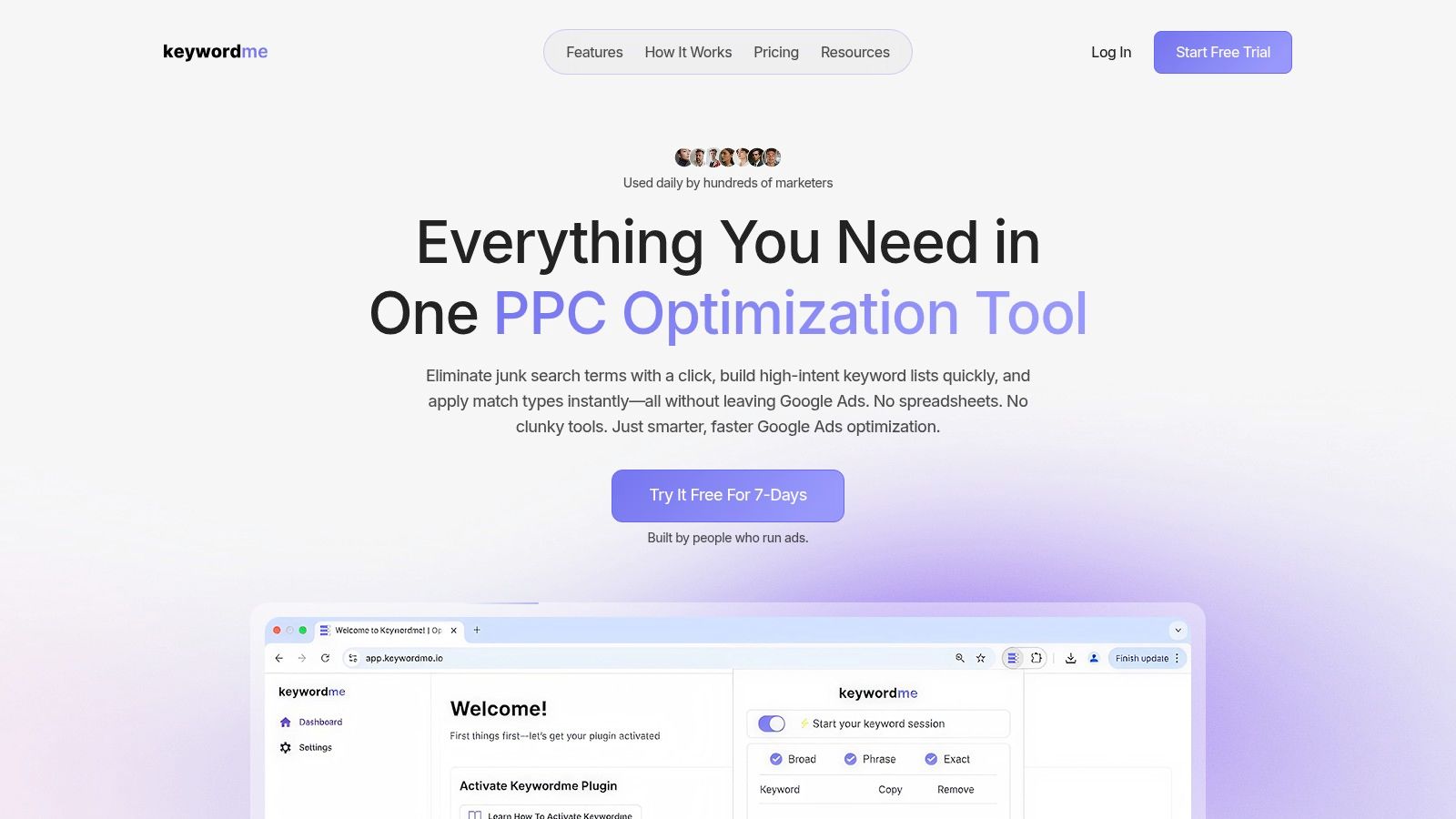
Why Keywordme is a Top Contender
Keywordme is built for speed and efficiency, claiming to make optimization workflows up to 10x faster. For digital marketing agencies or freelancers managing multiple accounts, this time-saving aspect is a game-changer. It transforms a multi-hour process into a task that can be handled in minutes.
Key Advantage: Keywordme’s seamless integration as a Chrome plugin allows you to perform advanced keyword optimization, including bulk additions and negative keyword management, directly within your Google Ads account. This eliminates cumbersome data exporting and importing, saving significant time and reducing the risk of manual errors.
Standout Features & Practical Use Cases
- One-Click Optimization: Instantly add negative keywords or apply specific match types (exact, phrase, broad) to new keywords directly from the search terms report.
- Bulk Keyword Management: Effortlessly copy, format, and paste large keyword lists without wrestling with spreadsheet formatting issues. This is perfect for building out new ad groups or campaigns quickly.
- Streamlined Workflow: Its all-in-one nature means you can research, manage, and optimize your PPC keywords in a single, unified interface, which is a huge step up from traditional methods. To get a better sense of this, you can learn more about how to automate your keyword research on Keywordme.io.
Pricing & Access
Keywordme offers a straightforward pricing model at $12 per seat per month. This affordability makes it accessible for freelancers and small businesses, while still being scalable for larger agency teams. You can test its full capabilities with a 7-day free trial to see the impact on your workflow firsthand.
- Automates time-consuming keyword management tasks.
- One-click functions dramatically simplify complex actions.
- Up to 10x faster workflow accelerates campaign ROI.
- Excellent bulk tools for handling large keyword lists.
- Affordable pricing with a free trial and strong support.
- Limited to Chrome browser users since it's a plugin.
- Per-seat pricing could become costly for very large teams.
Website: https://www.keywordme.io
2. Semrush
If you’re looking for more than just a keyword list, Semrush is the full-blown Swiss Army knife of SEO. It’s less of a single tool and more of an entire marketing toolkit, which is why it’s a staple for agencies and serious in-house teams. It truly shines as one of the best keyword research tools because it seamlessly connects keyword discovery with competitive analysis and rank tracking, all under one roof.
The journey often starts with the Keyword Magic Tool. You pop in a seed keyword, and it unleashes a massive, filterable list of related terms, questions, and long-tail variations. What makes it unique is the immediate ability to analyze the SERP features, see keyword intent (navigational, informational, etc.), and group related terms into topic clusters with a single click.
But the real power move is flipping the script. Instead of just finding keywords, you can plug in a competitor's domain and see every single keyword they rank for. The Keyword Gap feature lets you compare your domain against up to four competitors, instantly revealing valuable keywords they rank for that you’re missing out on. It’s an absolute goldmine for finding proven opportunities.
Key Features & User Experience
- All-in-One Workflow: Move from keyword research to content brief creation, on-page SEO auditing, and position tracking without ever leaving the platform.
- Robust Competitive Intel: Go beyond organic keywords to see competitor ad copy, PPC keyword bids, and even Product Listing Ad (PLA) data.
- Excellent Integrations: Easily connects with Looker Studio (formerly Google Data Studio) for custom dashboards and reporting.
Pricing: Starts with a limited free account. Paid plans begin at $129.95/month for the Pro plan, scaling up to Guru and Business tiers with higher limits and more features.
Website: https://www.semrush.com
3. Ahrefs
If Semrush is the Swiss Army knife, Ahrefs is the master craftsman’s chisel, renowned for its data accuracy and an industry-leading backlink index. While it’s a comprehensive SEO platform, its reputation as one of the best keyword research tools is built on the power and precision of its Keywords Explorer. It’s the go-to for SEOs who prioritize high-quality data and deep competitive insights.
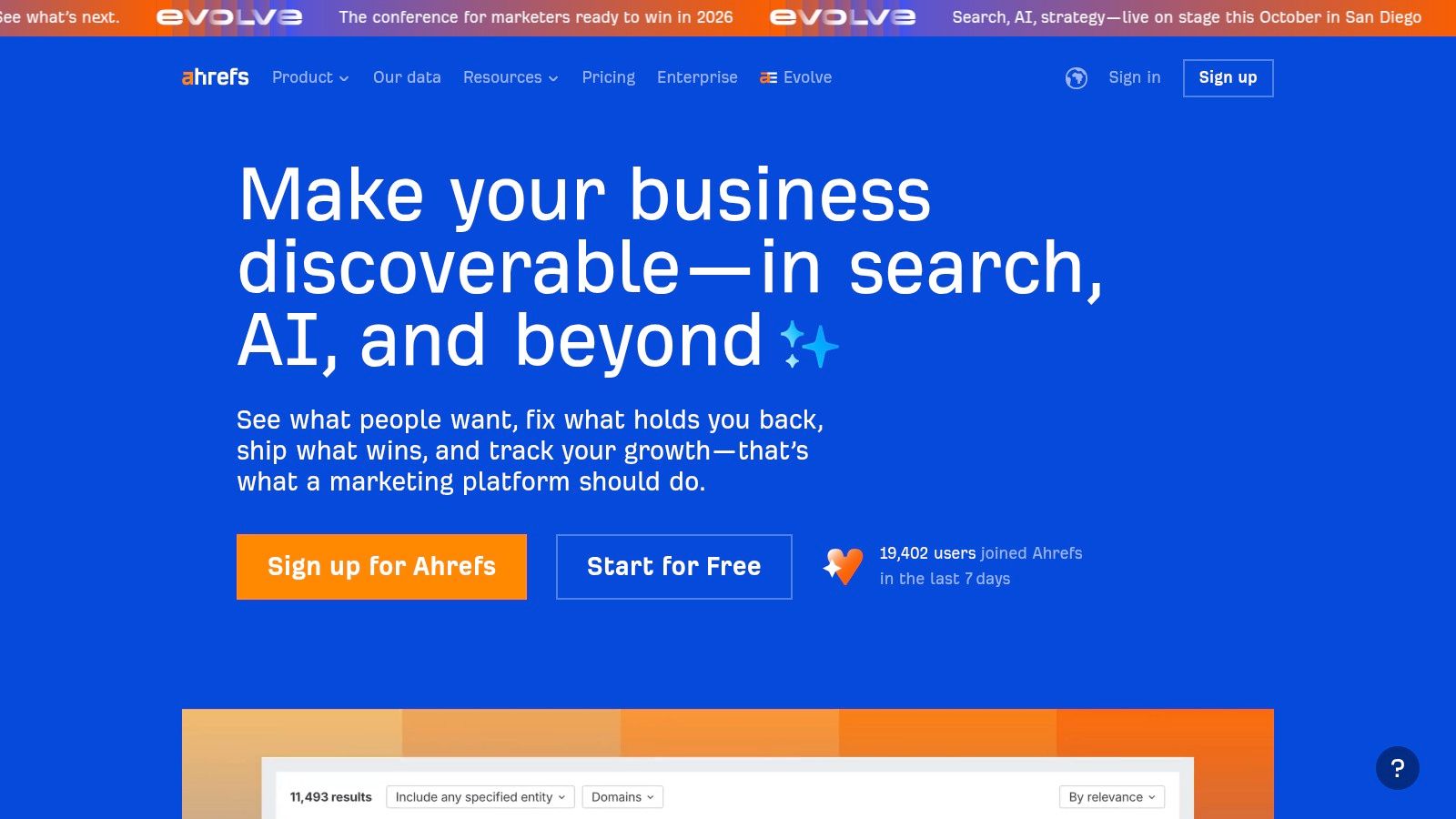
The Keywords Explorer tool is where the magic happens. Beyond standard metrics like search volume, it provides a unique "Clicks" metric, revealing how many searches actually result in a click. This is crucial for avoiding keywords dominated by SERP features that satisfy user intent without a click-through. Its SERP overview is exceptionally clean, providing a clear snapshot of the top-ranking pages and the backlink strength you'll need to compete.
Where Ahrefs truly excels is its seamless integration between keyword data and competitive analysis. You can effortlessly move from discovering a keyword to analyzing the top-ranking content and dissecting the backlink profiles of your competitors using Site Explorer. The Content Gap tool, similar to Semrush's, lets you find keywords your competitors rank for that you don't, providing a clear roadmap for your content strategy.
Key Features & User Experience
- Superior Data Quality: Widely respected for having one of the most accurate and frequently updated backlink and keyword databases.
- Click Metrics: See estimated clicks for keywords, helping you prioritize terms that actually drive traffic, not just impressions.
- Intuitive Interface: The UI is clean, fast, and makes complex data easy to navigate, even for those newer to advanced SEO.
Pricing: Offers a free Ahrefs Webmaster Tools account with limited access. Paid plans start at $99/month for the Lite plan, scaling up to Standard, Advanced, and Enterprise tiers.
Website: https://ahrefs.com
4. Google Keyword Planner
While many tools offer a universe of complex metrics, sometimes the most reliable data comes straight from the source. Google Keyword Planner is the OG of keyword tools, built directly into the Google Ads platform. Originally designed for PPC advertisers, it has become an essential, no-cost starting point for SEOs, making it a foundational player among the best keyword research tools available.
Its primary strength lies in its direct access to Google’s massive search data. You can discover new keyword ideas by providing a seed term or even analyzing a specific URL. The tool provides search volume ranges, competition levels (for ads), and estimated bid costs, which can be a valuable proxy for commercial intent. It’s particularly powerful for validating keyword ideas you’ve found elsewhere and getting a sense of seasonal trends directly from Google’s perspective.
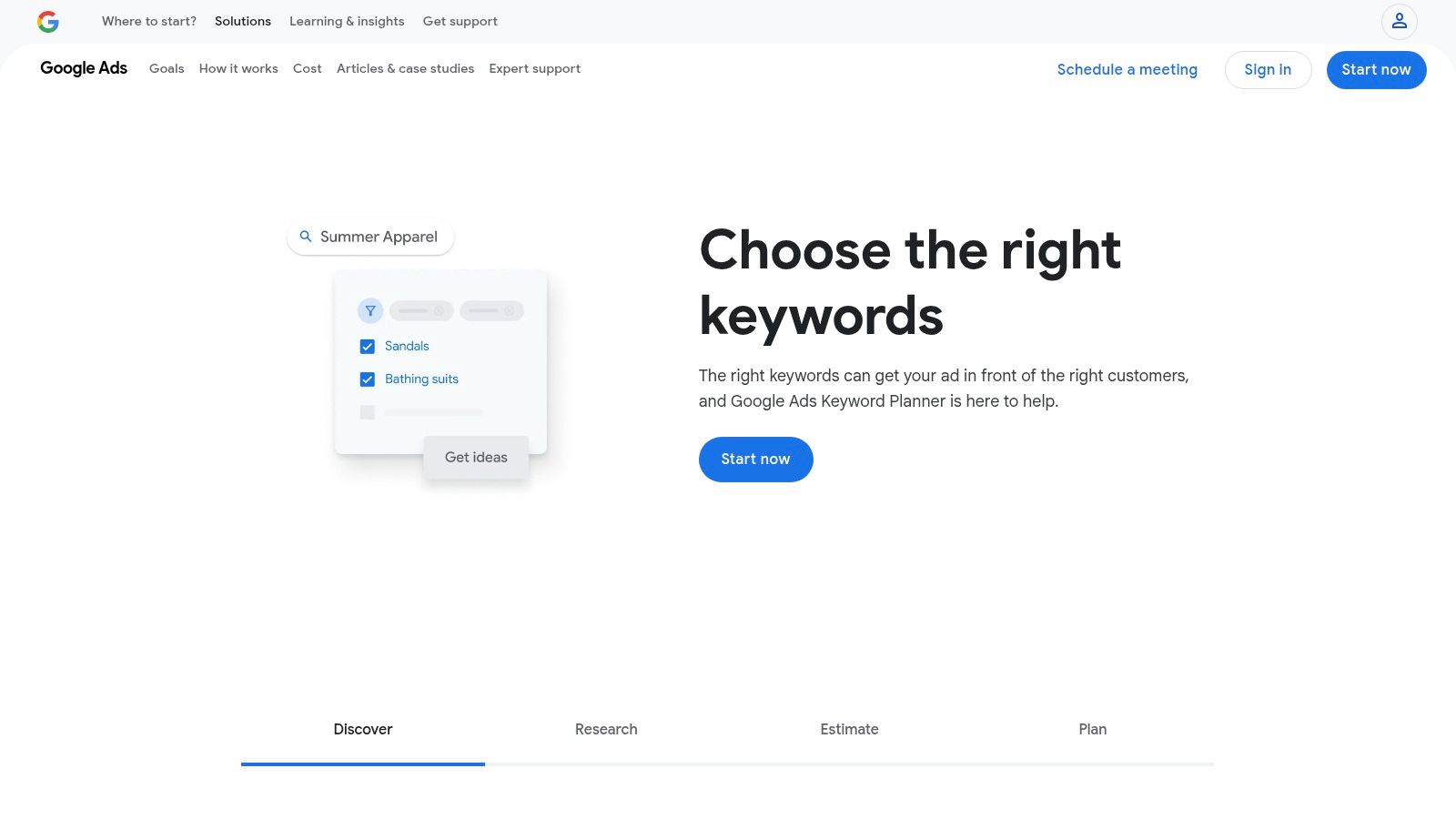
The "Discover new keywords" feature is a goldmine for brainstorming, while the "Get search volume and forecasts" function helps you understand the potential traffic and cost for a list of existing keywords. Once you've identified your target keywords using the Planner, you can learn how to maximize your ad's visibility and information with various Google Ads Ad Extensions. This simple, direct approach makes it an indispensable tool for grounding your strategy in solid data.
Key Features & User Experience
- Direct Google Data: Provides search volume trends, forecasts, and bid ranges directly from Google's advertising ecosystem.
- Granular Targeting: Filter keyword data by location down to the city or region, as well as by language, which is great for local SEO.
- PPC Plan Building: Seamlessly add keywords to ad groups and build out campaign plans directly within the Google Ads interface.
Pricing: Free to use with a Google account. However, you may only see broad volume ranges (e.g., 1K-10K) unless you have an active Google Ads campaign running.
Website: https://ads.google.com/home/tools/keyword-planner/
5. Moz Pro + Keyword Explorer
For those who want powerful SEO data without an overwhelming interface, Moz Pro is a long-standing and respected industry player. It has earned its reputation by making complex SEO concepts accessible, particularly for small businesses and teams just finding their footing. It confidently ranks among the best keyword research tools by pairing its intuitive Keyword Explorer with proprietary metrics that have become industry standards.
The platform is famous for its Domain Authority (DA) and Page Authority (PA) scores, giving you a quick, reliable way to gauge a site's (or a page's) ranking strength. The Keyword Explorer tool simplifies the research process by presenting keyword difficulty, monthly volume, and organic click-through rate in a clean, easy-to-understand format. It also offers a "Priority" score, which blends these metrics to help you spot the keywords with the best potential ROI, making it easier to decide what to target next.
Beyond just discovery, Moz Pro excels at integrating this data into a broader SEO workflow. You can seamlessly move from finding opportunities to tracking your rankings for those terms on both desktop and mobile. Its suite also includes a solid site crawl tool for technical SEO audits and a comprehensive link index for analyzing backlink profiles. This makes it a great all-in-one solution if you aren't ready for the complexity of enterprise-level platforms. For additional guidance, learn how to choose the right keywords for your strategy to maximize your efforts.
Key Features & User Experience
- Keyword Explorer: Clean interface with difficulty, volume, and a unique "Priority" score to identify high-impact keywords.
- Proprietary Metrics: Industry-standard Domain Authority (DA) and Page Authority (PA) for quick competitive assessment.
- All-in-One SEO Suite: Includes rank tracking, site crawl capabilities, and link research tools to support a full SEO campaign.
- Excellent Educational Resources: Moz is well-known for its beginner-friendly blog, guides, and training materials.
Pricing: Starts with a limited free account and the free MozBar tool. Paid plans begin at $99/month for the Standard plan, scaling up to Medium, Large, and Premium for more features and higher limits.
Website: https://moz.com/products/pro
6. Mangools (KWFinder suite)
If the all-in-one behemoths feel like overkill for your needs, Mangools is a breath of fresh air. Centered around its star player, KWFinder, the Mangools suite is designed for simplicity and efficiency, making it a favorite among bloggers, affiliate marketers, and small businesses. It proves that you don't need a complex interface or a massive price tag to access powerful SEO data, earning its spot as one of the best keyword research tools for those who value ease of use.
The process starts and ends with clarity. In KWFinder, you enter a seed keyword and instantly get hundreds of suggestions, each with a color-coded Keyword Difficulty (KD) score that’s famously accurate and easy to understand at a glance. It excels at unearthing long-tail keywords that larger tools might overlook. You can immediately see the top-ranking pages for that keyword, their key metrics, and the SERP features present, all without leaving the dashboard.
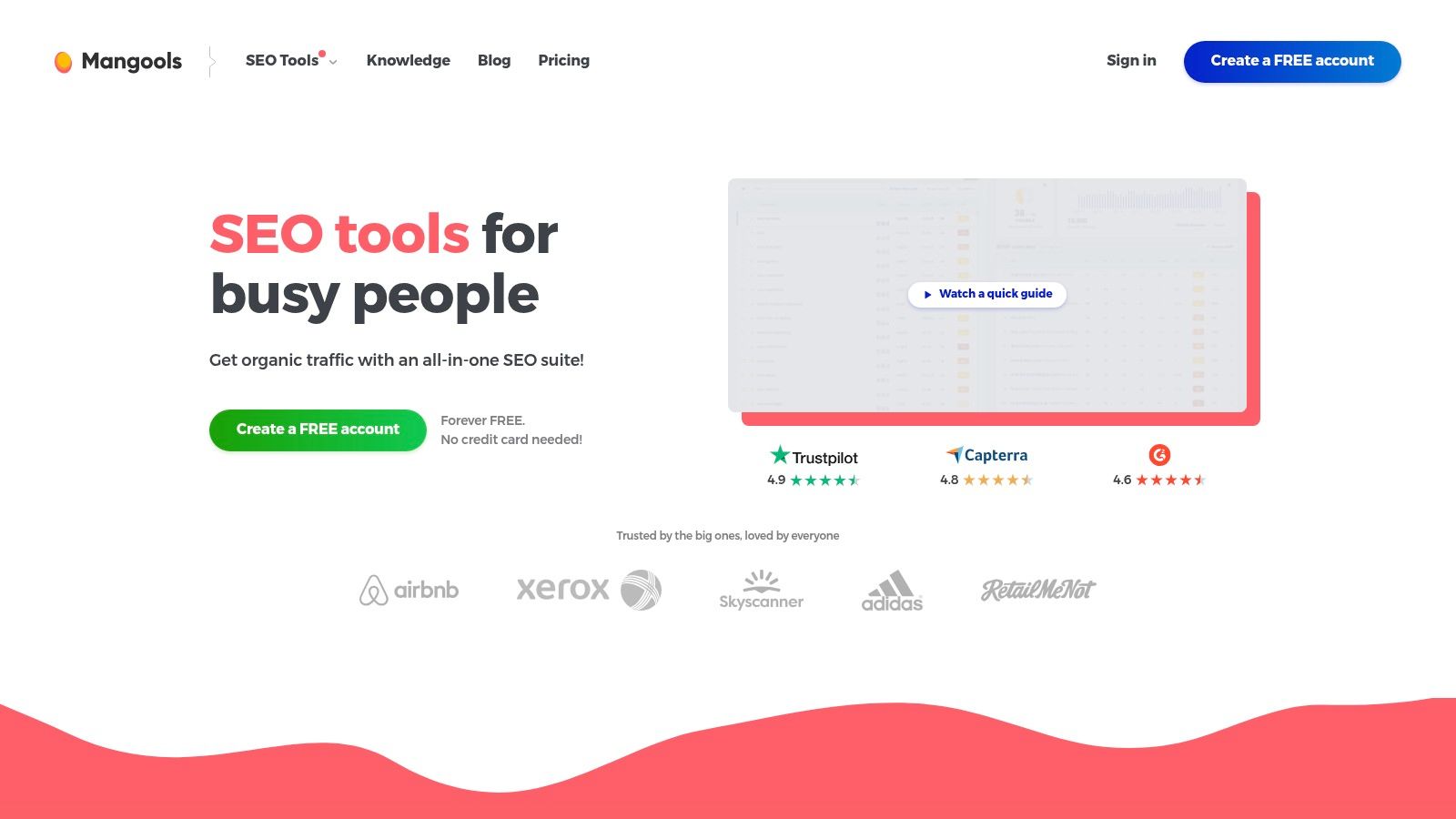
Beyond KWFinder, the suite includes SERPChecker for deep SERP analysis, SERPWatcher for rank tracking, LinkMiner for backlink analysis, and SiteProfiler for a quick overview of any domain's SEO health. The tools are seamlessly integrated but feel lightweight and focused, preventing the overwhelm that often comes with more expansive platforms.
Key Features & User Experience
- Intuitive UI/UX: The entire suite is exceptionally user-friendly, with a clean interface and helpful visualizations that make complex data digestible.
- Excellent Long-Tail Discovery: KWFinder is specifically praised for its ability to generate valuable, low-competition long-tail keywords.
- Bundled Toolset: Provides a complete, basic SEO workflow covering keyword research, SERP analysis, rank tracking, and backlink checking in one subscription.
Pricing: Offers a very limited free plan. Paid plans are highly affordable, starting at just $49/month for the Entry plan when billed monthly ($29.90/month annually), scaling to Basic, Premium, and Agency tiers.
Website: https://mangools.com
7. Ubersuggest
For those dipping their toes into SEO or working with a tighter budget, Ubersuggest by Neil Patel is an incredibly accessible entry point. It packages the core functionalities of a premium suite-keyword research, site audits, and competitor analysis-into a simplified, beginner-friendly platform. It has earned its spot as one of the best keyword research tools by lowering the barrier to entry without completely sacrificing utility.
The workflow is straightforward. You can start with a seed keyword to get hundreds of suggestions, content ideas based on top-ranking articles, and a quick overview of keyword difficulty. Or, you can enter a competitor's domain to see what they rank for, which is a great way to find proven keywords in your niche. While the data might not be as deep or update as frequently as enterprise-level tools, it provides more than enough actionable insight for small businesses and solo marketers.
What truly sets Ubersuggest apart is its pricing model. It offers one of the most affordable monthly subscriptions in the market and, uniquely, a lifetime purchase option. This makes it a compelling choice for freelancers or small business owners who want to avoid recurring fees while still getting access to essential SEO data.
Key Features & User Experience
- All-in-One Essentials: Provides a solid foundation of keyword ideas, content suggestions, basic backlink data, and site health audits.
- Simplified Interface: The UI is clean and easy to navigate, making it less intimidating for those new to SEO software.
- Unique Pricing Model: The availability of a lifetime deal is a rare and significant advantage for users looking to manage long-term costs.
Pricing: Offers a very limited free version with daily search caps. Paid plans start at $40/month for the Individual plan, with a significant discount for a lifetime purchase.
Website: https://neilpatel.com/ubersuggest/
8. SpyFu
If your keyword research philosophy is "know thy enemy," then SpyFu is your go-to intelligence operative. While many tools focus on discovering new keywords from a seed term, SpyFu’s core strength is reverse engineering your competitors' success. It's built from the ground up to expose every keyword your rivals rank for, every ad they've ever run, and every ranking change they’ve experienced over the last 15+ years.
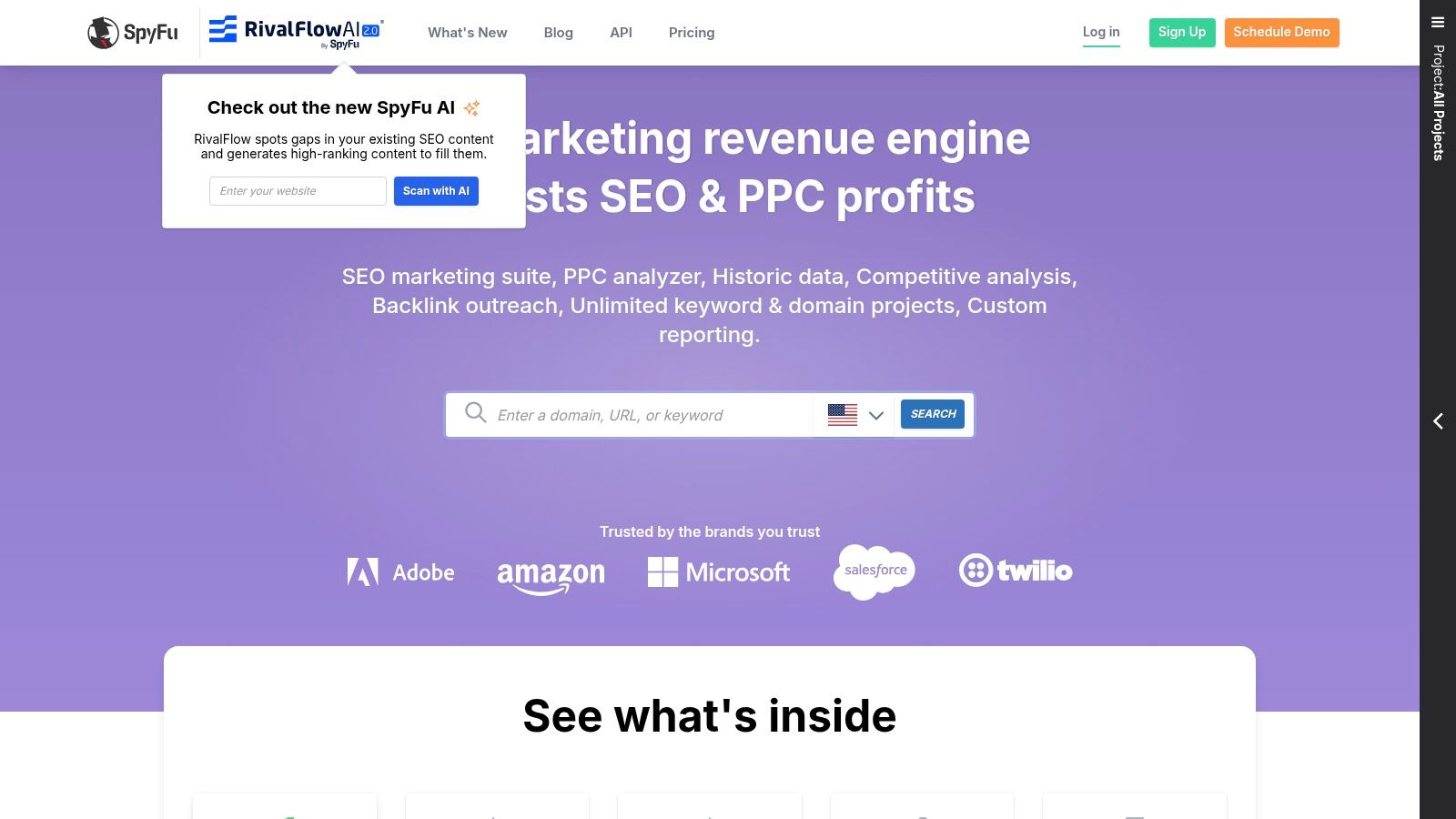
The primary workflow involves entering a competitor's domain. Instantly, you get a dashboard showing their estimated organic traffic, paid ad budget, and a complete list of their most profitable keywords for both SEO and Google Ads. This makes it one of the best keyword research tools for marketers who need a proven starting point. You can see the exact ad copy that has worked for others, saving you significant time and budget on testing.
What truly sets SpyFu apart is its historical data and its focus on PPC. Being able to see ad variations and keyword performance over time is a game-changer for anyone managing a Google Ads budget. Its competitive intel is so strong that many agencies use it specifically to build their initial campaign strategies, making it an essential tool for PPC-focused research.
Key Features & User Experience
- Deep Competitor Intel: Uncover a competitor's complete organic and paid keyword portfolio, including historical ad copy and ranking data.
- PPC Ad Advisor: Get specific keyword recommendations and "buy recommendations" based on your competitors’ most profitable paid keywords.
- Generous Data Access: Higher-tier plans offer virtually unlimited searches, exports, and data access, which is rare in this market.
Pricing: Starts at $39/month for the Basic plan. The Professional plan at $79/month unlocks more data and API access.
Website: https://www.spyfu.com
9. SE Ranking
SE Ranking positions itself as the high-value, feature-rich alternative to the big-name SEO suites. It offers a comprehensive toolkit that covers everything from keyword research and rank tracking to site audits and local SEO, often at a significantly more accessible price point. It’s an ideal choice for freelancers, agencies, and businesses who need robust functionality without the enterprise-level price tag, making it one of the best keyword research tools for those balancing budget and performance.
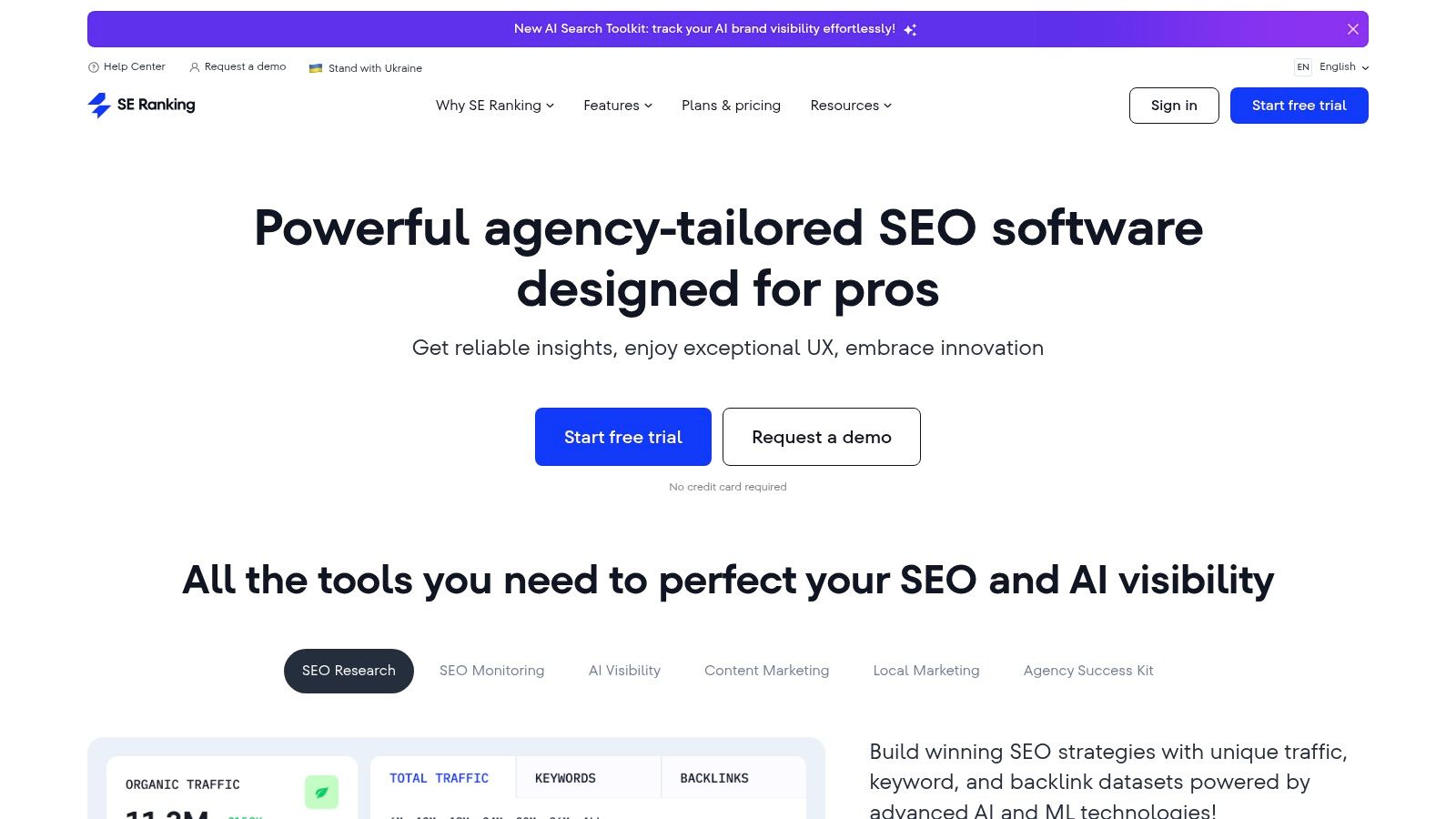
The platform’s Keyword Research tool provides all the essential data points: search volume, difficulty, CPC, and a deep analysis of the current SERP. Where it adds unique value is in its competitive analysis workflow. You can quickly pull a competitor's domain to see their top-ranking keywords and pages, then use the Keyword Gap tool to find specific terms they rank for that you don't. This direct, actionable intelligence is crucial for carving out a competitive edge.
SE Ranking also excels with its flexible pricing and agency-focused features. The plans are highly customizable based on the frequency of rank tracking checks and the number of keywords, allowing users to pay only for what they truly need. This model, combined with its capable tools, makes it a powerful and pragmatic choice.
Key Features & User Experience
- All-in-One SEO Suite: Combines keyword research, rank tracking, competitor analysis, website audit, and on-page checking in one interface.
- Strong Local & Agency Tools: Features include local rank tracking, lead generation tools, and white-label reporting for client-facing work.
- Flexible and Scalable Plans: Highly customizable pricing structure allows you to adjust limits and features to fit your exact budget and needs.
Pricing: Offers a 14-day free trial. Paid plans start as low as $55/month for the Essential plan, with Pro and Business tiers offering more features and higher limits.
Website: https://seranking.com
10. Serpstat
Serpstat positions itself as a powerful, growth-hacking tool for SEO and content marketing, offering a suite of features that punch well above its price tag. For freelancers, small agencies, and marketers on a tighter budget, it represents an accessible entry point into the world of all-in-one SEO platforms. It makes our list of the best keyword research tools because it bundles strong keyword discovery capabilities with rank tracking, site audits, and backlink analysis in one of the most cost-effective packages on the market.
Its core keyword research functionality delivers everything you’d expect: search volume, CPC, competition, and related keyword variations. Where it adds significant value is with its built-in keyword clustering and text analytics features, which help you group semantically related terms to structure your content pillars and identify content gaps more efficiently. This focus on topical relevance is a huge plus for modern SEO strategies.
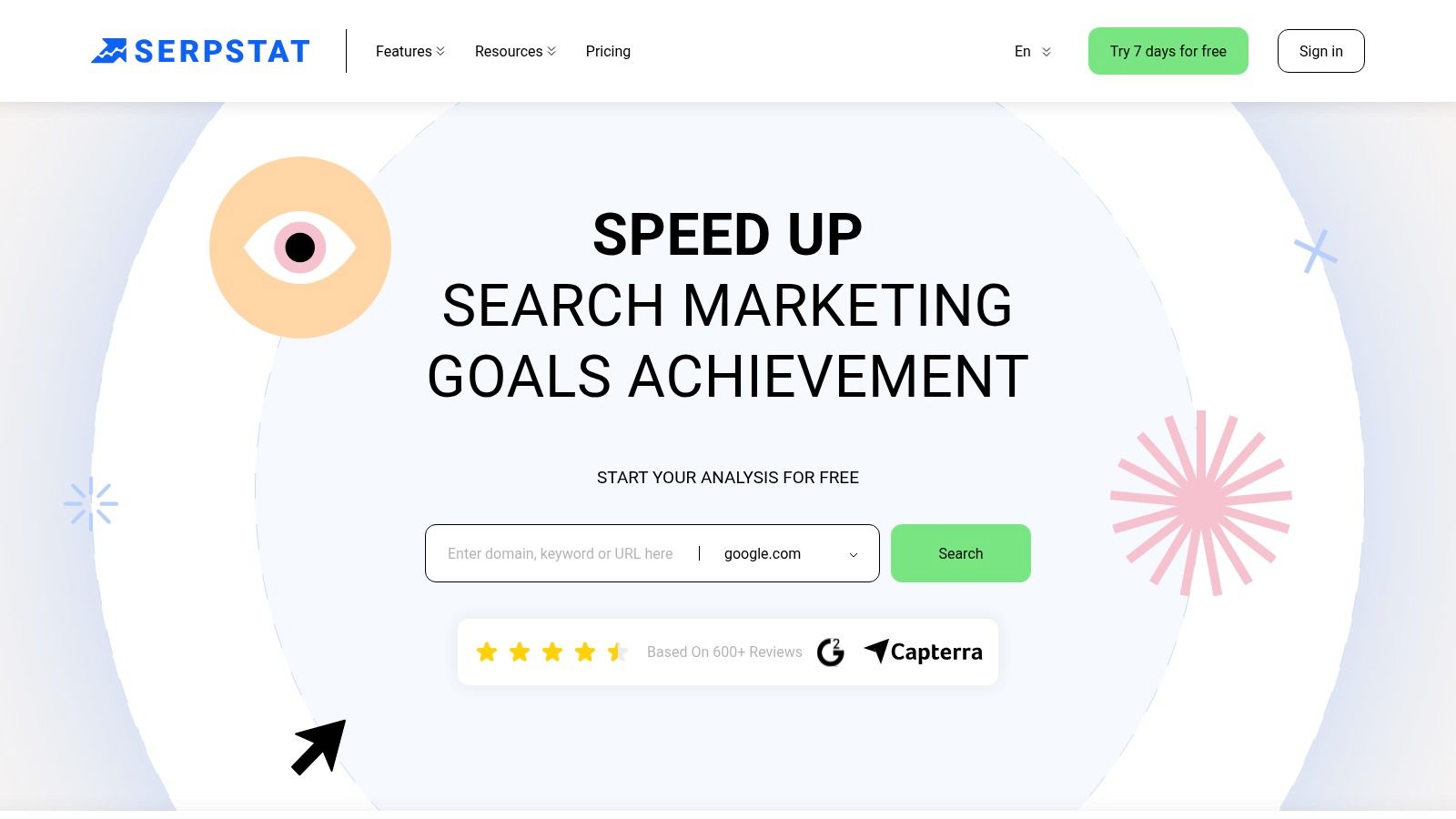
The platform also includes a "Missing Keywords" report, which is a clever way to compare your domain against top competitors. It quickly shows you high-volume keywords your rivals are ranking for on the first page of Google, but you aren't. This provides an immediate, actionable list of opportunities to pursue.
Key Features & User Experience
- All-in-One Affordability: Get access to keyword research, rank tracking, site auditing, and backlink analysis without the premium price tag of top-tier competitors.
- Keyword Clustering: Automatically group keywords by semantic similarity, making it easier to plan topic clusters and build out comprehensive content hubs.
- API & White-Label Options: Higher-tier plans offer API access for data integration and white-label reporting, a valuable feature for agencies serving multiple clients.
Pricing: Offers a very limited free plan. Paid plans start at $50/month for the Lite plan, making it one of the most affordable comprehensive tools available.
Website: https://serpstat.com
11. AnswerThePublic
If you ever feel stuck in a content rut, AnswerThePublic is the creative brainstorming partner you need. Instead of focusing on search volume and competition metrics, this tool taps directly into the user psyche by visualizing the questions people are actually asking search engines. It takes a seed keyword and explodes it into a series of visual "seeker" wheels, organizing queries by questions, prepositions, and comparisons. It's an indispensable tool for understanding user intent and generating endless content ideas.
This unique visualization of search data makes AnswerThePublic one of the best keyword research tools for content marketers and copywriters. It’s less about finding high-volume head terms and more about discovering the specific, nuanced long-tail questions your audience has. This insight is pure gold for creating blog posts, FAQ sections, and video scripts that directly address user pain points, helping you build topical authority and connect with your audience on a deeper level.
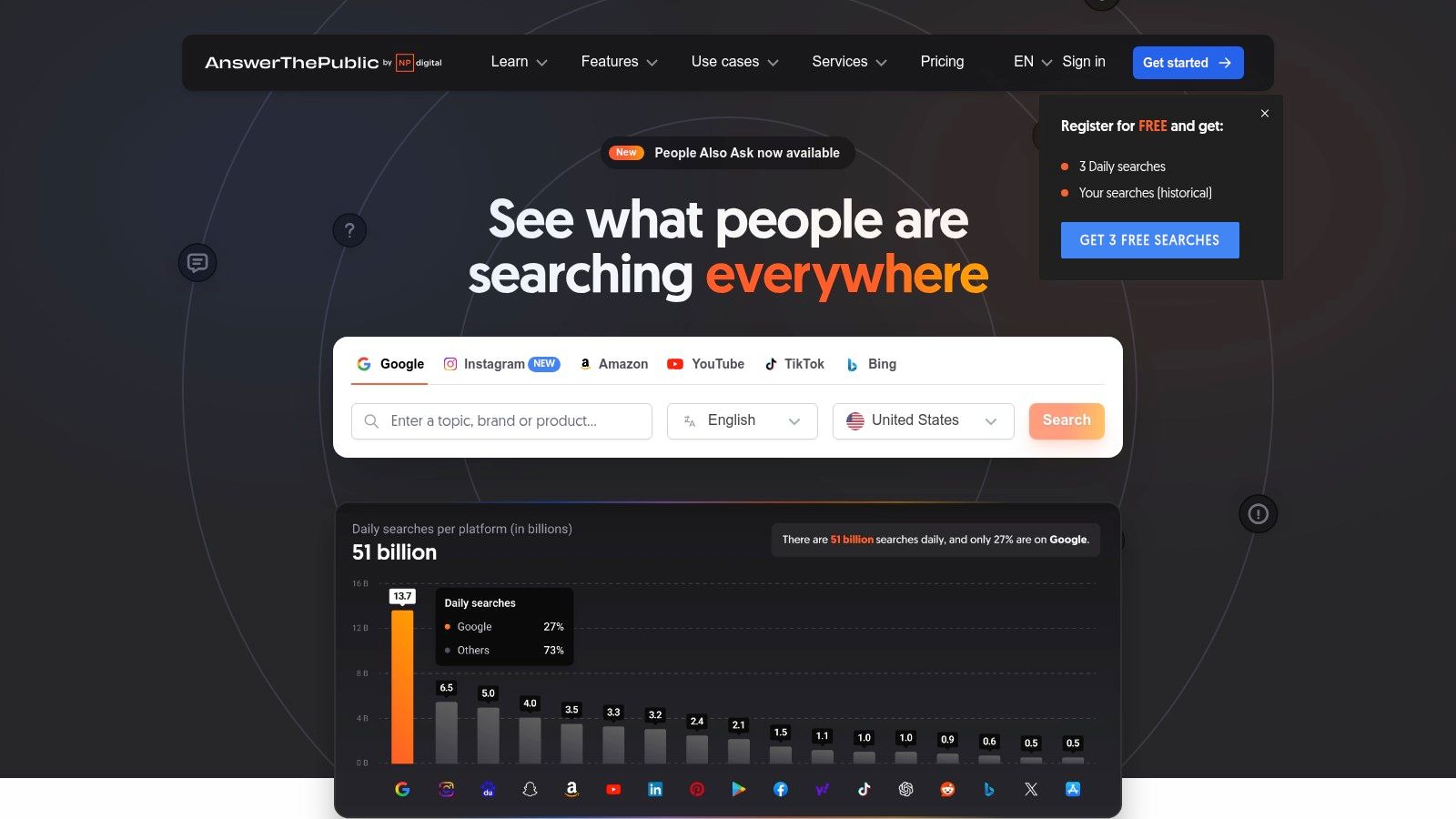
The power of the tool lies in its simplicity. You don't get bogged down with complex metrics. Instead, you get a clear, actionable map of your topic landscape from a human perspective. You can instantly see what your audience wants to know about "keto diets vs paleo" or which "how-to" questions they have about "learning guitar." It’s a direct line into the conversational queries that are perfect for voice search and featured snippet optimization.
Key Features & User Experience
- Visual Data Wheels: Unique and intuitive visualizations for questions, prepositions, comparisons, and alphabeticals that make brainstorming easy and effective.
- Content Idea Generation: Uncovers hundreds of long-tail keywords and content angles by mining Google's autosuggest data.
- Data Export & Monitoring: Export findings to CSV or image files and set up Search Listening Alerts to monitor new questions as they arise.
Pricing: Offers a free version with daily search limits. Paid plans start with a Monthly option at $99/month, an Annual plan at $999/year, and an Expert plan for agencies.
Website: https://answerthepublic.com
12. G2 – Keyword Research software comparison
Instead of being a tool itself, G2 is a meta-resource that helps you choose the right tool. It’s a massive B2B software marketplace where you can compare dozens of the best keyword research tools side-by-side, backed by verified user reviews. If you're feeling overwhelmed by choice, this is the perfect place to start shortlisting vendors based on your specific needs and budget.
Think of it as the ultimate pre-purchase research hub. You can filter tools by features, pricing models, and the size of the company they’re designed for. The real value comes from the user-generated pros and cons, which often reveal practical insights and limitations you won’t find in marketing copy. You can see how real users rate everything from ease of use to the quality of customer support.
The platform excels at providing a high-level overview. Its Grid reports and category pages visually map out the leaders, contenders, and niche players in the keyword software space. This allows you to quickly identify the top-rated options and see how they stack up against each other before you commit to a demo or free trial.
Key Features & User Experience
- Verified User Reviews: Access detailed feedback from real-world users, including what they like, dislike, and the business problems the tool solved.
- Side-by-Side Comparison: Use feature matrices to directly compare the capabilities of multiple tools on a single screen.
- Up-to-Date Leaderboards: G2’s Grid reports are regularly updated, giving you a current snapshot of the market landscape and top performers.
Pricing: Free to use for research and comparison. Pricing for individual tools is listed but should always be verified on the vendor’s website.
Website: https://www.g2.com/categories/seo-tools/f/keyword-research
Top 12 Keyword Research Tools Comparison
Making Your Final Choice
Alright, we’ve just taken a deep dive into a dozen of the best keyword research tools on the market. From the all-encompassing SEO suites of Semrush and Ahrefs to the laser-focused PPC brilliance of Keywordme and the intuitive content-ideation power of AnswerThePublic, the options are vast. It’s clear that finding the "best" tool isn't about picking a single winner for everyone; it’s about finding the perfect fit for your specific mission.
The journey through these platforms reveals a crucial truth: modern keyword research is so much more than just chasing high-volume, short-tail terms. It’s about decoding user intent, uncovering the questions your audience is really asking, and mapping out a competitive landscape. Whether you’re a freelance PPC specialist trying to maximize a client's ad spend or an in-house content marketer building a topic cluster from scratch, the right tool acts as your strategic co-pilot.
How to Pick Your Perfect Match
Feeling a little overwhelmed by the choices? That’s totally normal. Let’s break down the decision-making process into actionable steps so you can move forward with confidence. Instead of just picking the most popular option, consider what your primary workflow looks like.
- For the All-in-One SEO Generalist: If you're managing everything from on-page SEO and rank tracking to backlink analysis and content strategy, your best bet is a comprehensive suite. Ahrefs and Semrush are the undisputed champions here. They offer a unified dashboard where all your SEO data lives, making it easier to see the big picture. They come with a steep price tag, but for agencies and serious in-house teams, the investment often pays for itself in efficiency and insights.
- For the Budget-Conscious SMB or Solopreneur: If you need powerful data without the enterprise-level cost, tools like Mangools and SE Ranking offer incredible value. They provide a fantastic user experience and deliver the core functionalities you need to find low-competition keywords and track your performance, all without breaking the bank. Ubersuggest also fits perfectly here, offering a generous free tier and affordable plans for those just getting started.
- For the Hyper-Focused PPC Specialist: When every click costs money, you need data that's built for paid search. This is where a specialized tool shines. A platform like Keywordme is designed specifically to help you find profitable keywords, organize them into tight ad groups, and avoid wasting budget on irrelevant terms. General SEO tools are great, but for the Google Ads pro, a PPC-first approach is a game-changer.
- For the Content Creator and Ideator: If your main goal is to fuel your blog or YouTube channel with fresh ideas, look no further than AnswerThePublic. Its visual, question-based approach is second to none for understanding the nuances of what your audience is searching for. It helps you move beyond basic keywords and into the realm of true topic authority.
Final Thoughts Before You Dive In
Remember, the most feature-packed tool is useless if you don't use it. The key takeaway from this massive list is that usability and workflow integration are just as important as the raw data itself. Nearly every tool we've covered offers a free trial or a limited free version. Use them!
Spend a week with your top two or three contenders. See which interface feels intuitive. See which one presents data in a way that sparks ideas for you. The best keyword research tools will feel less like a clunky database and more like an extension of your own strategic thinking. Now go find your secret weapon, get your hands dirty with the data, and start winning those SERPs.
Tired of sifting through SEO-focused data for your PPC campaigns? Keywordme is one of the best keyword research tools built specifically for Google Ads users, helping you find high-intent keywords and build perfectly structured ad groups in minutes, not hours. Stop guessing and start building profitable campaigns from the ground up by visiting Keywordme to see how it works.


.svg)